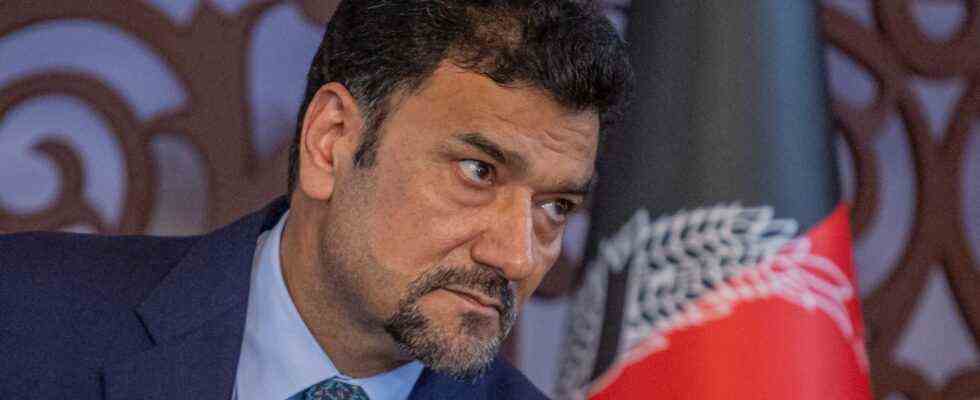Status: 16.09.2021 10:10 a.m.
In neighboring Afghanistan, Tajikistan, there are fears that the Taliban’s ideology could also spread here. It is from here that Afghanistan’s ambassador in Dushanbe defends himself against the Taliban.
An empty chair, the Afghan flag, above it the portrait of the previous Vice President of Afghanistan. In the Afghan embassy in Tajikistan’s capital, Dushanbe, one looks in vain for Taliban symbols. Ambassador Mohammad Sochir Achbar sharply criticizes the radical Islamic Taliban – and calls the embassy in Dushanbe “the center of resistance for Afghanistan”.
“The Taliban have neither respect for international organizations, nor for international law, nor for Islam,” says Achbar in an interview with the ARD studio Moscow. “Nowhere in Islam is it said that women should not work, that they cannot be teachers or hold high positions.” The rights of women are very important to the ambassador, who was also sent to Germany at the time. “We ask the whole world to speak out loud about defending women’s rights.”
Security summit in Tajikistan: How the neighbors deal with Afghanistan
Demian von Osten, ARD Moscow, daily topics 10:15 p.m., September 15, 2021
The protests continue
Tuesday morning at the embassy: Afghan women came to protest. They wrote slogans in Tajik and English on posters: “Pakistan, get out of Afghanistan!” – Pakistan is seen as a major supporter of the radical Islamic Taliban. Another slogan: “Support Punjshir!” The valley in northern Afghanistan has long been considered one of the last regions to oppose the Taliban. Although the Taliban reported the conquest of the valley, it remains unclear whether the resistance has been completely broken.
The military leader Ahmad Massoud in particular gained notoriety through the fighting in the Punjjir Valley. He belongs to the ethnic group of Tajiks in Afghanistan, which makes up around a quarter of the Afghan population. Massoud’s father fought in Afghanistan and was posthumously awarded the most important order in Tajikistan. There are numerous portraits of Massoud’s father hanging in the Afghan embassy in Dushanbe.
The old state flag is still waving over the Afghan embassy in Tajikistan – here they want to continue fighting the Taliban.
Image: REUTERS
“Taliban will soon face serious problems”
Ambassador Achbar admits that the Taliban have now “conquered everything”. “But they couldn’t force us to keep our hearts silent,” he says. “I think the Taliban will have serious problems in two or three months.” He hopes for international pressure. His argument: The Taliban government is not yet recognized internationally. But in Tajikistan people are wary of developments in the neighboring country to the south. The border, which is more than 1,300 kilometers long, runs through mountainous terrain that is difficult to control.
“Four or five districts of the border area are occupied by fighters from Tajikistan,” explains Faridun Chodisoda, a political scientist from Dushanbe. More fighters could move from Tajikistan to Afghanistan and bring back Taliban ideas. “The Taliban have a different ideology than, say, Al Qaeda or the so-called Islamic State. It is closer to us and therefore one has to fear that it could spread to Tajikistan,” explains Chodisoda. Possibly also about refugees.
Ask for financial help
Tajikistan’s authoritarian President Emomalij Rahmon has closed the border with Afghanistan for the time being. But many in the country assume that Afghan refugees could come at some point. “Tajikistan is a hospitable country; it is ready to take in refugees,” says Nigina Yurmatova from the non-governmental organization RCVC, which works with the UN refugee agency UNHCR. “But the most important thing is the economic basis for it. If Tajikistan takes in refugees, it needs all-round help.” The European Union has already committed 160,000 euros to help up to 5,000 refugees in regions near the border in Tajikistan.
Afghanistan, hastily abandoned by the West, also worries the political leaders of the region. Security issues are at the center of two regional conferences in Dushanbe. Tajikistan, which the Taliban rejects, also meets Pakistan, one of the Taliban’s most important supporters. Russia and China will also be at the table on Friday – even if only virtually via video switch. After the withdrawal of the West, opportunities arise for the two great powers in the region.

